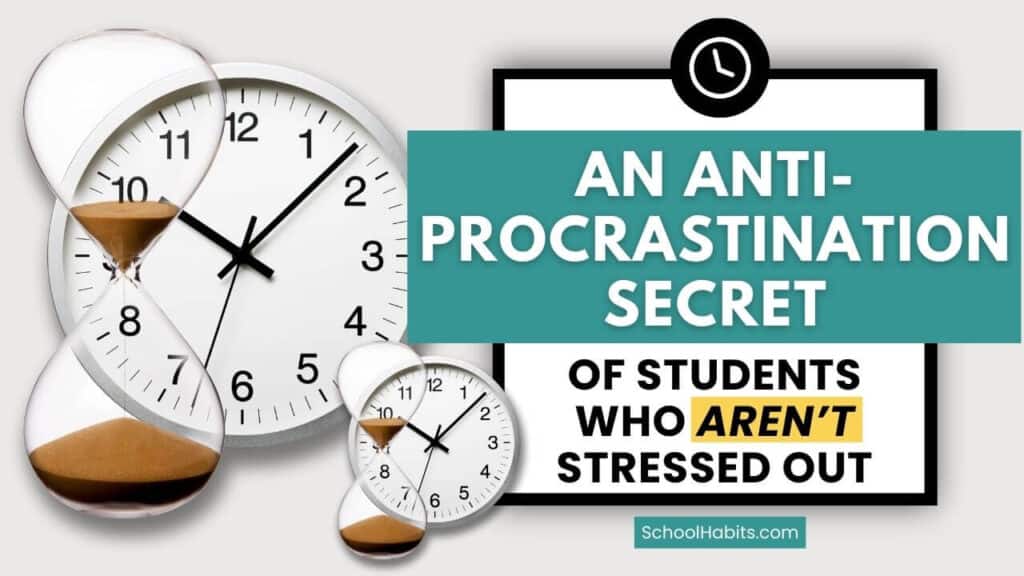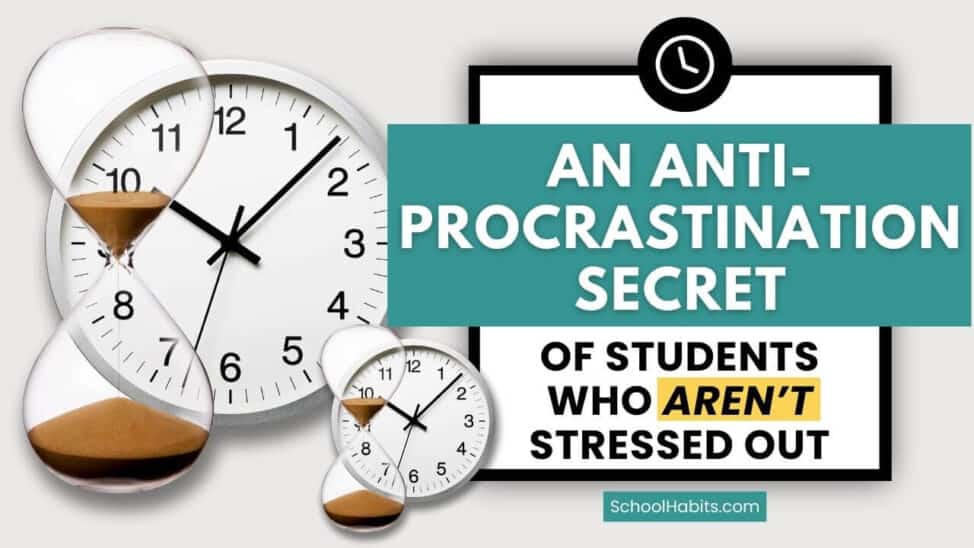
By Katie Azevedo, M.Ed.
You know when your teacher assigns a huge project that’s due next week, and it’s a big deal, but you’re not that stressed out about it because it’s not due until next week … and you have plenty of time?
… And every day leading up to the project deadline is not that stressful because you still have plenty of time… which means that you don’t need to start the project yet …
until oh my goodness, the project is due tomorrow and now you’re so stressed out!
I know you know. I see you. I’m glad you’re here.
While some level of procrastination is normal, chronic procrastination that leads to chronic stress is dangerous and disruptive.
In this blog post, I will share an anti-procrastination secret of students who aren’t stressed out. Yes, there’s such a thing as a student who isn’t stressed out, and in most cases, the reason has to do with procrastination. As in, they don’t do it.
An Anti-Procrastination Secret of Students Who Aren’t Stressed Out
The truth is that on a fundamental level, we procrastinate to avoid pain. We avoid tasks we know we should do because we want to avoid failure, judgment, discomfort, and sometimes even reality. I have many blog posts and videos with procrastination strategies, like this one and this one. You might find those helpful.
The unfortunate truth, however, is that procrastinating to avoid pain only leads to more pain. When you procrastinate, you feel rushed, stressed, shameful, frustrated, and exhausted – and your grades suffer too.
So here’s the anti-procrastination secret of students who aren’t stressed out: They work on projects and assignments (and study) on the days that technically they don’t have to.
This is such an important strategy. I’m going to work hard to put it in other words so that it’s very clear:
The students who are the most academically successful and the least stressed out are those who chip away at long-term projects, essays, and assignments, well in advance.
They’re making progress on these things when no one is looking. When the teacher isn’t checking. When there’s no assignment in Google Classroom saying “work on your essay.”
The students with the least amount of stress are those who make progress on projects when no one asks them to. Why? Because they know that it’s due at some point.
The students with the least amount of stress are those who use “no homework” or “light homework” days to study for tests that are a week away … even though the teacher didn’t specifically say to.
The students with the least amount of stress are those who read the next chapter in their book if they have time. Why? Because they know it’s going to be assigned anyway.
Is this making sense?
Now, you might be thinking, no way, Katie. No way people do this.
But here’s another little secret of top students:
They don’t tell you they’re doing this. They just are. Top students aren’t walking around shouting “I’m going to work on my history paper today!” But they do.
Now, just to clarify, I’m not saying that the top students with the least amount of stress love doing this – or even like it, for that matter. But they do it anyway because they’ve learned that procrastinating is painful. And they’ve learned from the pain of past experiences.
Students with the least amount of stress know they can simultaneously not want to do something and still do it.
They’ve also learned that it’s less painful to work on a project or study for 30 minutes a day in a low-pressure environment than it is to stay up all night before a deadline in a panicked state.
The ability to acknowledge your emotional state (I don’t want to do this right now!” and your desires (I don’t technically have to work on this right now!) and take action regardless is maturity.
Emotional regulation is 1000% tied to grades, mindset, productivity, and procrastination. I’m not saying it’s easy, but it really is the anti-procrastination secret of students who aren’t stressed out.
How to Use This Anti-Procrastination Secret
As I wrote in the section above, the key to avoiding the stress of procrastination is to start before you want to, and to chip away at studying and projects a little bit each day, even when no one is looking.
For long-term assignments, essays, and big projects, break down the big task into a series of smaller tasks. I teach you exactly how to do that here. Use my free Project Manager and Organizer Template to apply the strategy I teach you in that tutorial.
For studying, you want to use Spaced Repetition and my free Study Planner Template.
Additional Anti-Procrastination Tips and Resources
Below, I’m going to list my top resources that are related to this post. Some have to do with procrastination, and some have to do with being stressed. Pick and choose which ones you would find most helpful.
- Anti-Procrastination Tips for People with ADHD
- How to Make a Task Less Boring So You Actually Do It
- How to Study Less (And Not Procrastinate)
Additional Student Mindset Tips and Resources
Additional Anti-Stress Tips and Resources

